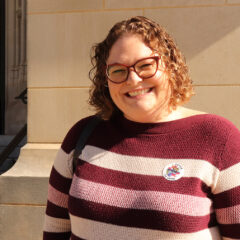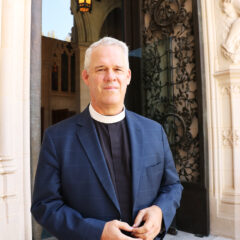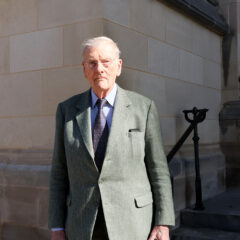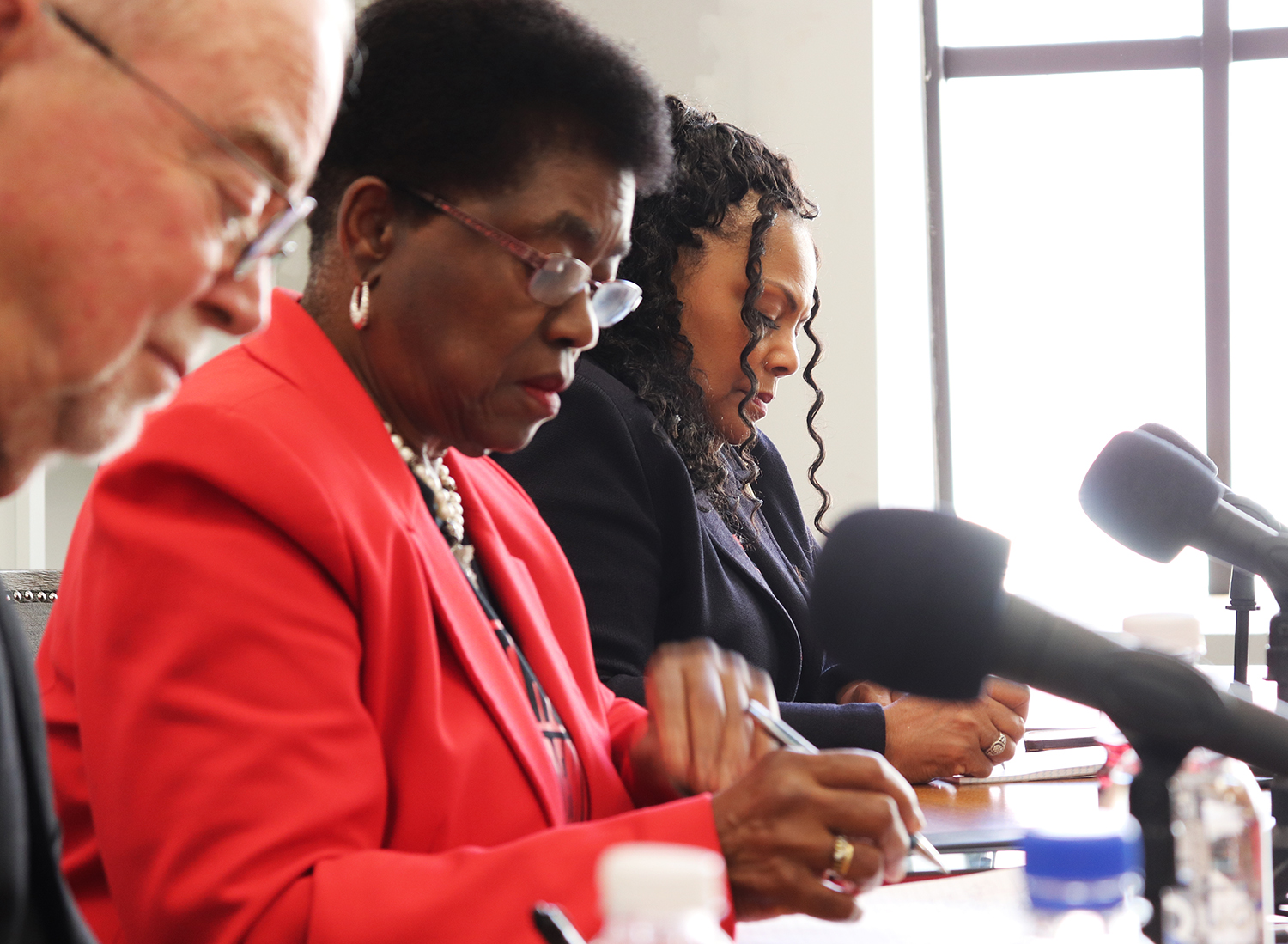
WASHINGTON (RNS) — At the headquarters of the National Council of Negro Women Inc., about midway along Pennsylvania Avenue between the White House and the U.S. Capitol, the Revs. Barbara Williams-Skinner and Jim Wallis sat in a briefing room to get a noontime update Tuesday (Nov. 5) from state faith leaders working with some 900 poll chaplains across the country.
Most of the poll chaplains, all volunteers for Faiths United to Save Democracy, an organization convened by Williams-Skinner, Wallis and Sojourners President Adam Russell Taylor since the last presidential race to keep peace at the voting sites, reported a relatively problem-free election so far.
Not far from downtown, at Washington National Cathedral, some 300 people had stopped by to pray during an Election Day vigil before the cathedral’s clergy, with other Christian, Jewish and Muslim leaders, shared prayers and sacred readings from their traditions at a service that began at noon.
It was a quintessentially Washington day, as, five miles apart, people focused on prayer and the polls after a fraught lead-up to a historic Election Day.
Prayer was not limited to the cathedral, and some did not wait for Election Day. On Monday evening, several houses of worship in the District held an in-person vigil, lining portions of 16th Street with candles. The Washington Interfaith Network held a Sunday afternoon service at a United Methodist church.
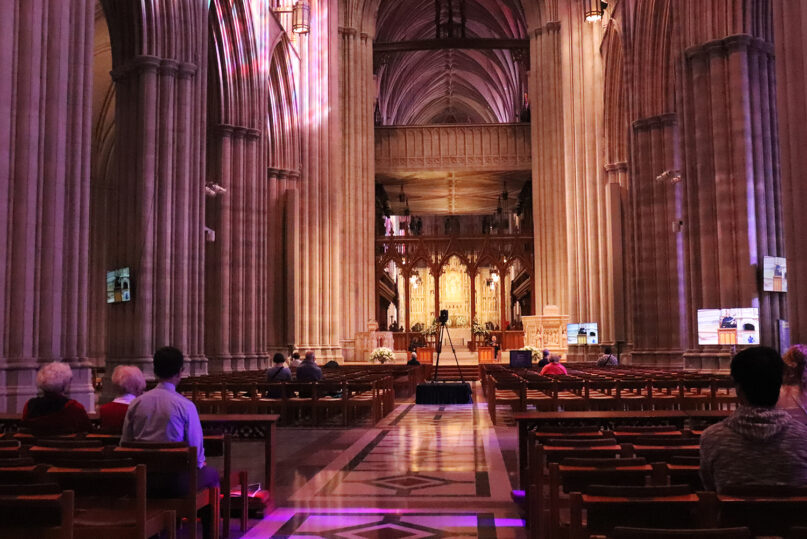
Washington National Cathedral hosted an Election Day vigil on Tuesday, Nov. 5, 2024. RNS photo by Adelle M. Banks
Williams-Skinner said 2,700 people were on an FUSD prayer call the night before the big day for the multiracial and multifaith initiative. The midday call on Election Day also opened and closed with prayers as the participants sought blessings on “those who are standing in lines to exercise their rights” as well as the poll workers there to help them vote.
Before she went quickly down the list of faith leaders who were set to report about on-the-ground conditions, she reminded them that their particular political work was supposed to be nonpartisan.
“You all do know that this is a nonpartisan conversation, and we appreciate that,” she said. “You’re going to have your party later about whatever.”
RELATED: Prayer, contemplation and comfort food as voters go to polls
The Rev. Dontà McGilvery, one of the co-leaders for the organization in Arizona, said that at the polling place in Phoenix where he was stationed, one man made some voters uncomfortable by requesting they add his name to their ballots.
“He’s been crossing the 75-feet marker several times and getting into it with the director here at the polling site,” said McGilvery, referring to the line past which electioneering is illegal. “But overall, it’s been really smooth. Also in Tucson, Arizona, things are going well. I’ve been talking to the people there, the poll monitor there, and every place says it’s the same, that it’s been smooth sailing.”
“We’re in Huntsville,” said the Rev. Ulysses Kincey, who had been checking with his colleagues in other Alabama cities, such as Birmingham, Montgomery and Mobile. “I haven’t heard anything over the state that has been anything other than smooth sailing so far, thank the Lord.”
Wallis seemed thrilled to hear the reports, at one point punching his fist in the air as he sat next to Williams-Skinner.
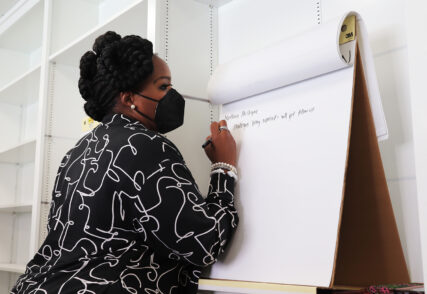
Andrea Boudreaux, a faculty member of the Skinner Leadership Institute, notes reports from faith leaders about experiences of poll chaplains across the country. RNS photo by Adelle M. Banks
“I’ve heard two of our reporters now use the word smooth — I love that word,” said Wallis, who had to leave the war room in the afternoon to teach a class at Georgetown University, where he runs the Center on Faith and Justice, and returned later in the day. “Let’s remind ourselves it takes a lot of work for things to go smoothly, so keep smoothing things out.”
The Rev. Steve Bland, a co-leader of the FUSD campaign in Michigan, noted the state’s historic early voting pattern and that there were 162 poll chaplains in seven cities in his state. Amid the “steady stream all day long” of voters, he reported one incident that made him late to the call with the FUSD leaders.
“We did have a problem from Benton Harbor,” he said of a report from a poll chaplain there, who said “one of the Republican watchers was restricting him from being there or speaking to voters. So I got our core team leader over there to get over there to address it.”
Rabbi Jonah Dov Pesner, director of the Religious Action Center of Reform Judaism, added that rabbis who had been trained by FUSD were also able to be a “nonanxious presence” at the polls. “Thank God, there has not been any situations that we’re aware of where rabbis had to intervene,” he said. “We have not heard any stories of shenanigans.”
Williams-Skinner appreciated the positive reports but wanted to see more activity, she said, including reaching those still hesitant about going to the polls during the last hours when they had an opportunity.
“Just do a video: Why vote?” she said. “You have a lot of reluctant voters. Not just young people. You have reluctant older voters. So if you can do that, and you can text it to me here, that would be great.”
She repeated the request for videos to post on social media after the youngest speaker on the midday call, Cherish Williams, a college student in North Carolina, noted that “there has not been a lot of young people coming in to vote today.”
At the cathedral, people of a range of ages showed up for prayer and contemplation. “Since we started early this morning, people have been very grateful for having a space to come and sit and be in quiet or listen to prayer or pray on their own,” said its dean, the Rev. Randy Hollerith. “And that’s exactly our goal, just to be a sanctuary on a day that I know is stressful for people on both sides of the aisle.”
Natalie Pavlatos, who lives in Bethesda, Maryland, saved her election sticker after she voted early to affix to her sweater. “I just felt like coming here; it just felt like a place to be,” said Pavlatos, who was raised Catholic but describes herself as “just spiritual these days.”
“With all of the turmoil, it just felt like coming and sitting and being calm and kind of mindful for a few moments was the right thing to do today,” she said.
Charles N. Brower, an Episcopalian and a registered independent from nearby Chevy Chase, Maryland, said he came to the cathedral with a specific purpose. “The end objective is the preservation of democracy,” he said of his prayers as he departed the neo-Gothic cathedral. “Whichever way it goes, we better keep it.”
Back on Pennsylvania Avenue, Williams-Skinner was thinking about the Michigan poll incident and what might be next steps for acquainting election officials with the concept of poll chaplains next Election Day. But overall she was pleased with the results heard by a late-afternoon call.
“I heard a steady flow of voters’ enthusiasm,” she said. “Many young people out. Some elders with young people showing them how to vote. There were some young people taking their parents voting. I think just the whole democratic process of people being engaged and picking their leaders is a powerful one. And that is the essence of democracy.”
RELATED: Black America’s ‘twin pillars’ partner to boost vote

